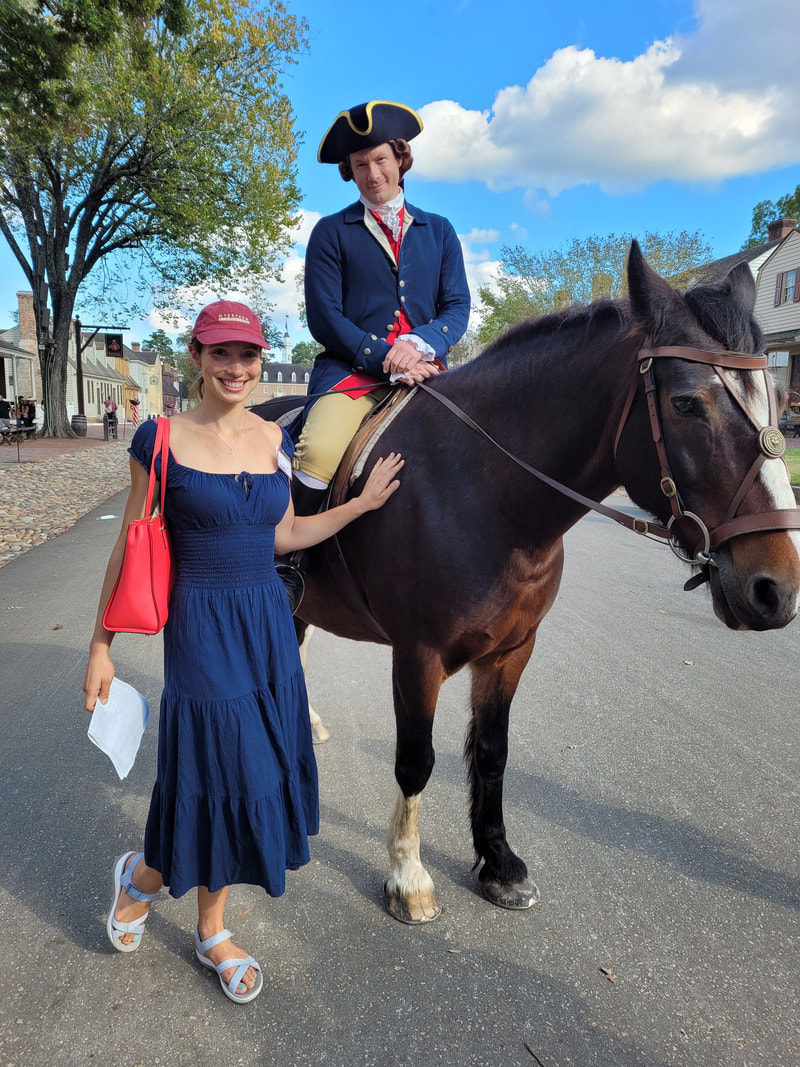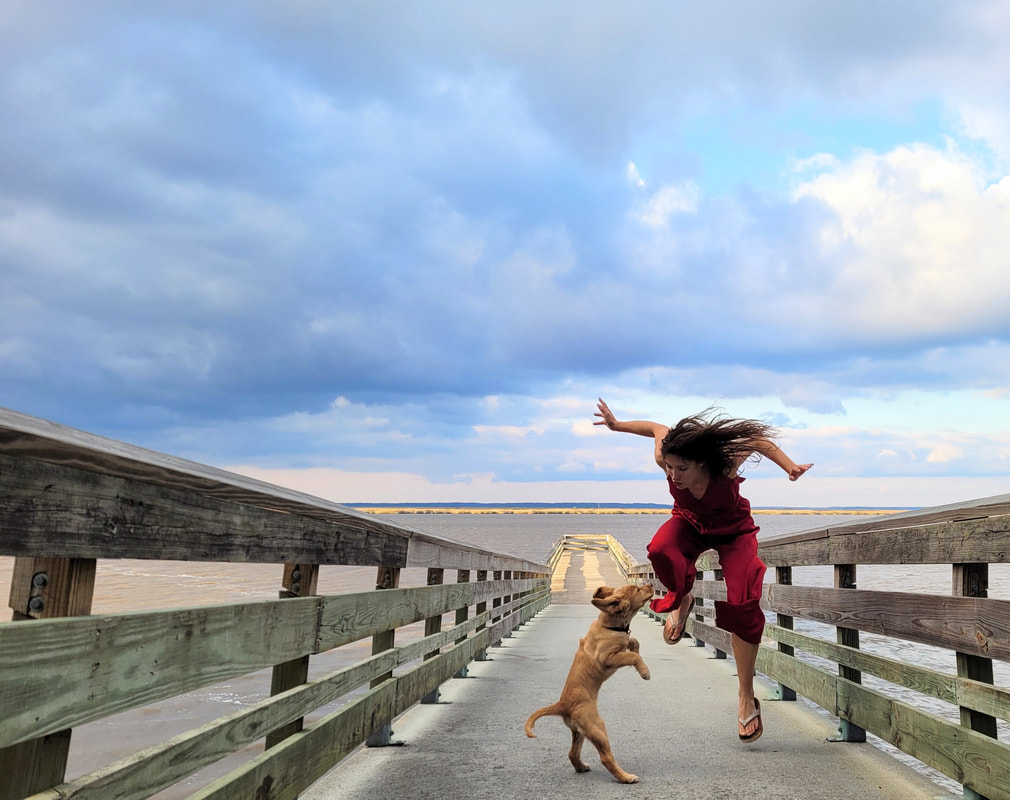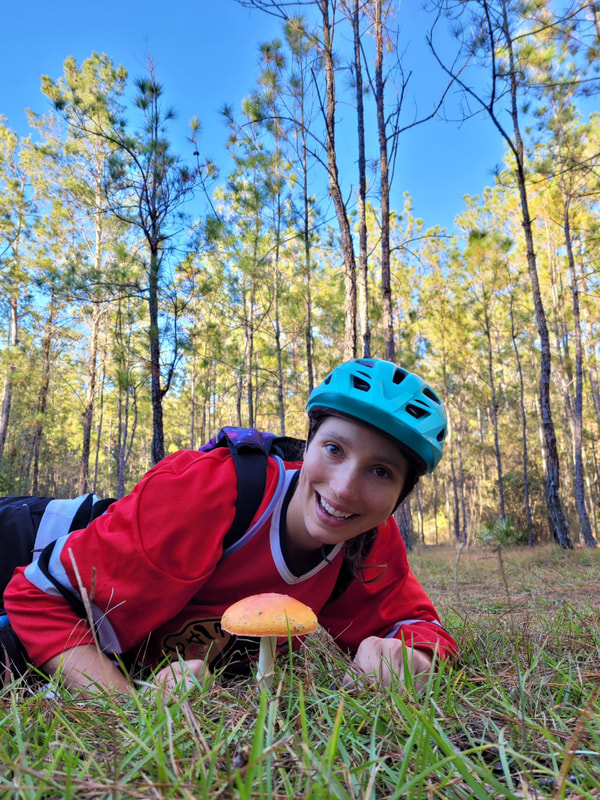|
Image: @TheHappyTalent So I met Thomas Jefferson the other day. Not literally — literally, he was a costumed interpreter at Colonial Williamsburg. But in my heart, in my imagination, in my mind, it felt like I was really, truly meeting Jefferson, writer of the Declaration of Independence, defeater of pirates, drafter of the Virginia Statute for Religious Freedom... and subject of my original song, "Jefferson." It... wasn't how I expected to feel. Obviously Thomas Jefferson has been dead since 1826, so why would I get emotionally invested in "meeting" him at a living history museum? That amazing, starstruck feeling stuck with me all day, and it got me thinking about imaginary play in adulthood. As someone who did a master's on adult play behavior and who continues to blog about it to this day, I sometimes think about examples of imaginary play in adulthood. For me, it usually looks like visualization. I don't shoot hoops — I win NBA championships. I don't play catch — I outsmart the defense and make the perfect cut into the end zone. This is what I look like when I "play catch": Image: The Happy Talent on Facebook This doesn't just make me better at practice (see also: You Won’t Believe What This Cop Did After Disarming a Robber, or How to be Better at Everything)... it also makes "routine" and "boring" stuff breathtaking and fun. I also engage in imaginary play sometimes when writing music (some of the songs are based on reality; others are based on stories and examples I invent in my mind) or when playing with dogs or children at the beach. Image: @TheHappyTalent This happens more often than you'd think — I literally got eaten by an alligator like 12 times the other morning at Windrock Playground, then fairy-wanded back out... But overall, it seems like imaginary play in adulthood is pretty rare. Which makes sense. I'm supposed to be some kind of "expert," and the idea of talking to costumed interpreters in the first-person was incredibly uncomfortable for me. I can get up on stage and sing a song I wrote in front of a hundred — or, who cares? a thousand! — people, no problem. I can strike a conversation with anyone (after all, there is no such thing as "small talk," only small minds)... But I was all nervous and weird about introducing myself to a well-dressed man on Duke of Gloucester... I wasn't the only one. Each time I saw a first-person actor in the streets, park guests sort of pointed and whispered, but rarely approached the interpreter (at least until after I did). I've thought about why this is awkward and how to make it more fun, immersive, and engaging — and, importantly, how these tips and strategies could make everyday life a more playful, imaginative, and exciting experience. Here's what I came up with — but feel free to share your ideas in the comments! 1. "Small talk" is hard for a lot of people. Imaginary play is hard for a lot of people. Interacting with costumed actors in the first-person requires both. As I previously mentioned, there is no such thing as "small talk." Only small minds. If you are a smart, active, interesting person, and you actually care what other people say, talking about the weather can be incredibly fun. Next thing you know, you're comparing notes on Early Girls vs. Mortgage Lifters; talking about your favorite conditions to surf different beaches; or gasping for breath laughing at a story about a poorly-timed tornado. If you actually care what the costumed actors say, they will do most of the work when it comes to "small talk." All you have to do is listen attentively and respond accordingly. It's kind of like what many people would call "flirting," but I would call "basic human communication skills." 2. Imaginary play makes most adults feel incredibly self-conscious. Most of the imaginary play I do, I do inside my own mind, or with dogs or children. Other adults are not really part of it. But doing it out loud, in front of other adults, is actually pretty daunting for me. If you're trying to feel less self-conscious, whether so you can "play" with interpreters at a living history museum or so you can be sillier or more humorous in your everyday life, consider some of the advice I shared in 3 Proven Ways to STOP Caring What People Think About You and Live a Happier Life:
I loved Colonial Williamsburg so much, I stayed an extra day — AND added Yorktown to my itinerary! Image: @TheHappyTalent 3. Achieve flow, presence, and mindfulness... through knowledge. Part of the reason imaginary play isn't typically as fun for adults as children is that flow is achieved when you strike the right balance of challenge and mastery. That is why I think "adult preschool" is kind of a scam — finger painting is not appropriately challenging for most adults, whereas cake decorating, woodworking, or knitting provide a similar, but age-appropriate, challenge. Likewise, playing pretend with costumed actors is not going to be nearly as challenging as reading a book, watching a documentary, and applying and testing that new knowledge through witty repartee with a passionate historian. In the nine months leading up to my trip to Colonial Williamsburg, I'd read The Pioneers: The Heroic Story of the Settlers Who Brought the American Ideal West, by David McCullough; My Dear Hamilton: A Novel of Eliza Schuyler Hamilton, by Stephanie Dray and Laura Kamoie; Bourbon Empire: The Past and Future of America's Whiskey, by Reid Mitenbuler; Marriage, a History: How Love Conquered Marriage, by Stephanie Coontz; and Fault Lines in the Constitution: The Framers, Their Fights, and the Flaws that Affect Us Today, by Cynthia Levinson and Sanford Levinson. I was ready to trade barbs about characters' political rivals, make jokes about their social and love lives, and clarify questions that hadn't been answered in my books. Investing in just a little bit of background knowledge will allow you to be intellectually and conversationally playful with them. I found my debate with John Randolph to be just as enlivening as I'd imagine a real debate would have been, back in the day... which made me feel even more like I was back in the day. I previously mentioned that the absolute worst thing that happened while I was talking to a character was that people left because they weren't interested. Fine by me! tWhat I didn't mention is that multiple times, I was approached by another guest who said, "Thank you for your questions — that made the tour a lot more interesting," or, "That was really cool — I never would have thought to ask that!" And, I must admit: I generally don't like being the center of attention... but when crowds gathered to listen to (and sometimes participate in) an in-character conversation I was having, it actually felt kind of cool to imagine I was stoking revolutionary fervor in the same manner as early patriots. How does this apply to everyday life? Long before Williamsburg, I'd realized that the more I knew about the world around me — the clouds, the flora, the architecture — the more engaged and immersed I was in the present moment... and the less I found myself dragged from the moment to ruminate, stress, or wonder what people might be thinking about me. It made me a voracious reader of field guides and nonfiction. It made me someone who actively seeks historical fiction and documentaries, so I can immerse myself in any town I visit or any local beverage I sample. It's hard to worry about outside concerns when you know that any moment, you might see a spoonbill, a black bear, a painted bunting, a naked lady, or an amanita. Image: @TheHappyTalentI 4. Live your whole life like you're traveling. If you are at a living history museum, chances are, you are out of town. So why even worry about what others will think? You drove a long way to be here — no get out there, be silly, and make the most of it. Be playful. Learn how to make something you've never made before. Pay extra to ride a horse. Indulge your curiosity, and act like no question is a bad question. Chances also are, you will never visit this place again — just like with any other form of travel. Here's the everyday takeaway: one of the best pieces of advice I feel like I've ever written is that you should live your whole life like you're traveling. As I wrote in Do What You Do When You Travel While You're At Home:
If you're willing to do all the things I've suggested thus far to have a better time at the living history museum... why wouldn't you do the same things to make your everyday life just as interesting, educational, and social as that experience? Why not start a conversation with a stranger? Why not ask someone about their life or craft? Why not treat the grocery store like a trip to a foreign market or colonial past? Why do a scenic drive in Virginia, then ignore the flowers and trees you pass on your drive to your parents' house? Life, like living history museums, is only boring if you make it boring. *** I will never forget how exciting it was to meet Thomas Jefferson — how energized and starstruck I was for the rest of the day thinking about him. How I almost accidentally asked for his autograph, because I got that carried away. Imaginary play is not something we need to stop doing because we are adults — being adults is probably all the more reason we should be practicing suspending disbelief, cognitively reframing, and immersing ourselves in a splendid fantasy, instead of just getting stuck inside our own heads and worrying about our own problems all the time. That's my advice for visiting living history museums and incorporating imagination into adulthood. What's yours?
0 Comments
Leave a Reply. |
About the Author

Eva is a content specialist with a passion for play, travel... and a little bit of girl power. Read more >
Want to support The Happy Talent? CLICK HERE!
Or Find me on Patreon!
What's Popular on The Happy Talent:
Trending in Dating and Relationships:
What's Popular in Science: Playfulness and Leisure Skills:
Popular in Psychology and Social Skills:
Categories
All
|































 RSS Feed
RSS Feed